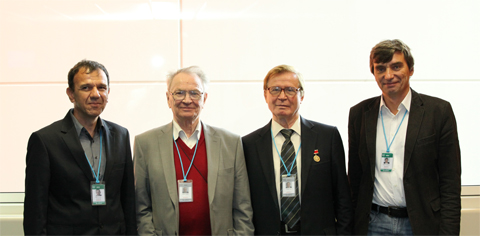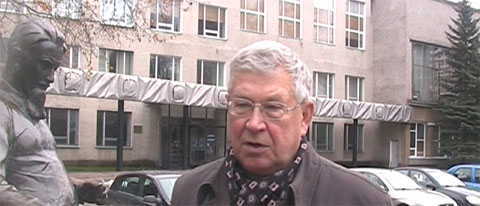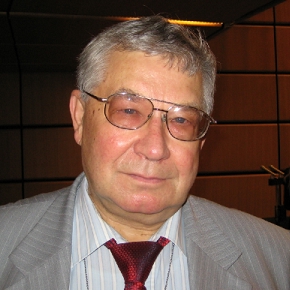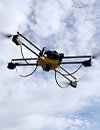 |
||
|
Nuclear Veterans for the Future AtomInfo.Ru // AtomInfo.Bg, PUBLISHED 09.11.2014 At the 58th annual session of the IAEA General Conference in Vienna, correspondents of AtomInfo.Ru and AtomInfo.Bg interviewed the heads of the International Union of Veterans of Nuclear Energy and Industry (IUVNEI): chairman Viktor M. MUROGOV, executive secretary Evgeny M. AKIMOV, and deputy chairman Yuri P. SARAEV. CONTINUED BELOW Evgeny Akimov and Yuri Saraev (in the center); photo by AtomInfo.Ru  Viktor Murogov: photo by AtomInfo.Ru  IUVNEI is an open institution Yuri Saraev: The International Union of Veterans of Nuclear Energy and Industry (IUVNEI) is an open nonprofit association incorporating sixteen non-governmental organizations from nine countries. The Union operates for over three years already. One of the tasks of our Union is convincing the population of the benefits of nuclear energy, one of most ecology friendly kinds of energy with almost unlimited resources. Besides, we are striving to preserve nuclear veterans' knowledge and experience to pass to the younger generation. Evgeny Akimov: While creating the IUVNEI, we took into account the following factors. As it is known, consequences from the operation of nuclear facilities are not always positive. The global nuclear industry witnessed negative consequences as well, including such wide-scale accidents as TMI-2, Chernobyl, and Fukushima. It is evident that major accidents cause people's negative attitude towards nuclear energy. On the other hand, experts are sure that as far as safety is concerned, today's nuclear power industry is equipped better than any other energy sector. As veterans and professionals, we are trying to explain all this to the population, especially to young people. However, nuclear managers, which are in charge of publicity events, address us only from time to time. One more problem is the generation gap in the nuclear industry, which is becoming almost critical. Further development of nuclear power is impossible without the transfer of traditions, knowledge and experience accumulated. We, veterans, are sure that the elimination of that gap or its reduction to permissible levels would be of great importance. We keep contacts with the IAEA within the programs for nuclear knowledge preservation & management. For example, we maintain close ties with Yanko Yanev who headed that work in the IAEA and then promoted the establishment of the Nuclear Knowledge Management Institute in Vienna. Apart from that, we participate in the IAEA-arranged seminars. We are pleased by the fact that nuclear operators and nuclear regulators in the IUVNEI member-countries favored the creation of the Union. They see benefits from our activity and hope it would be fruitful. Let me give you a bright example of knowledge transfer. When the Kalinin NPP management took the decision to extend service lives of units 1 and 2 (the task is solved for unit 1), it was just nuclear veterans from that nuclear plant and from Rosenergoatom that made a great contribution as they knew and remembered all details and particulars of the NPP construction and operation. We are sure that that project fulfillment would encounter great difficulties without nuclear veterans, their knowledge and their intuition. Virtual museum Yuri Saraev: I'd like to mention one more project, where the IUVNEI active participates. In association with the Obninsk Institute of Atomic Energy at the National Research Nuclear University MEPhI, we proposed to open a nuclear history chair so that veterans - teachers and experts - could deliver lectures on the history of national and global nuclear industries. The Institute of Atomic Energy already possesses a video library of lectures delivered by leading scientists - from Albert Einstein, Enrico Fermi and Max Planck to our contemporaries (V.I. Subbotin, I.I. Novikov, V.V. Orlov etc). It should be noted that in addition to historical reports ("that reactor was built in 19__"), we are planning to give technology development analyses. Just recollect Enrico Fermi's bright dreams when the generation of fission energy became practicable. What has changed since? What are the ways taken by the nuclear industry? What hopes were laid, what forecasts were made, and what do we have at present? We are going to tell students about all this. Certainly, discussions and disputes are inevitable. Take, for instance, the Chernobyl accident, where Evgeny Akimov and I were liquidators. So much time has passed since, but still there are a lot of controversial opinions. Viktor Murogov: To be exact, the situation with the chair is as follows. When we first touched upon that matter at the MEPhI University, the answer was:"The chair presumes a list of disciplines, subjects, etc", and it was quite reasonable. The chair is a symbol of organizational activity. Therefore, they suggested that we should not be attached to the formal notion of a chair but create instead a Center (Laboratory) of the history of nuclear science & technology. The idea of a course of lectures on nuclear history is quite popular. A group of Russian authors headed by L. Riabev issued a rather complete history of defense atomic projects but we lack similar reviews with a detailed analysis on peaceful utilization of nuclear energy. At present, we have courses of lectures for schoolchildren as well as for directors and chief engineers of nuclear power plants. Recently, a version for nuclear managers was issued to be used at the Rosatom Academy. We have prepared a popular edition of nuclear history for a wide circle of learners, among them economic executives, local authorities, and intellectuals. We are trying to go behind the nuclear industry borders. For example, at the invitation of the Head of RosNano Corp. A. Chubais, we delivered a course of lectures for schoolchildren and their masters in Nanograd near Samara. Participation in the Nanograd summer school was useful for us from viewpoint of events arrangement and direct communication with the younger generation and teachers. Looking into the future, we would like to organize - in the framework of the abovementioned Center of the history of nuclear science & technology - a virtual museum of nuclear energy at the Institute of Atomic Energy - IAE (Obninsk) to demonstrate the development of scientific ideas in that field. The IAE has already provided rooms for that museum. There is a large volume of various information represented in printing matter, digitized videos, textbooks, etc., which was gathered for years by enthusiasts. We hope that the MEPhI officials would continue to render us support in the future. We prepared (and already sent - Note by AtomInfo.Ru) a letter from the IUVNEI Council to Sergey Kiriyenko, where we asked the Head of Rosatom to give us assistance in the fulfillment of our plans (including provision of office equipment) relating to the development of the museum web-site, issue of video materials, preparation of lectures and textbooks, and lecturing in Rosatom's information centers in Russia and abroad. The virtual museum web-site would be regularly updated. We plan to issue veterans' recollections, scientific papers, and educational matter. Besides, starting from 2014, we would hold annual seminars to discuss urgent problems of the nuclear sector. It need to be explained why we maintain so close contacts with the Obninsk Institute of Atomic Energy. In recent years, that institute has become a big international campus with a learning center for foreign students. Students from Turkey and Vietnam already study there. Soon the Institute would take youths from Bangladesh. The total number of students from the above countries should exceed one thousand. One should pay attention to the fact that the IAE is receiving students from countries - newcomers in nuclear power. Besides, those countries are to promote the development of industrial culture. We hope that the IUVNEI would succeed in raising the perception of peaceful nuclear energy in those countries to the proper level. Foreign affairs Yuri Saraev: Whom should we call veterans? It is a good question. At present, we are shifting the center of gravity to persons being prepared for retirement. They still have powder in the powder-horns, they worked under market conditions, and we are going to involve them in the veteran movement. Do all veterans are anxious to share their knowledge with young people? I can answer this question. We haven't witnessed mass rejection on the part of veterans since the Union foundation. There was no fear of knowledge transfer. On the contrary, we saw the support of our ideas and the desire for consolidation. Of course, there were cases when we heard something like "Don't bother me; I'm not going to share knowledge with anyone because you'll fire me thereafter as not wanted". But when we started to talk to such people, to explain to them our aims & purposes, the negative attitude vanished, and those people became our partners. By the way, some countries had no nuclear veteran associations, and we are glad that the activity of the Union had initiated the formation of national veteran organizations. Viktor Murogov: I'd like to add a few words about annual Russian seminars held by our Union. We hope to arrange such events in East European countries - members of the IUVNEI. We are to meet more frequently and exchange opinions. Evgeny Akimov: Moreover, the Union Charter has the article indicating that we should gather four times a year in different countries. It goes without saying that if we are going to Bulgaria, we would discuss issues being of interest to the Bulgarian side, if to Hungary, to the Hungarian side, and so on. Yuri Saraev: The Bulgarian Union of Nuclear Industry Veterans was the last to join the IUVNEI. For that occasion, we visited Kozloduy and took part on the celebration of the 40th anniversary of the nuclear power plant. I should admit that we were leaving Bulgaria with mixed feelings. Some time, six reactors operated at the Kozloduy NPP. However, four units with VVER-440 reactors were decommissioned long before the expiration of their service lives. At present, similar power units successfully operate in Hungary and in Finland. In our opinion, Bulgarian power units were closed down as a result of certain political games. Viktor Murogov: Both Russian and Bulgarian nuclear power industries marked jubilees in 2014: 60th anniversary of the pioneer nuclear plant in Russia and 40th anniversary of the Kozloduy NPP in Bulgaria. Bulgarian colleagues sent an invitation to us. In the framework of the jubilee celebrations, we had a sitting of the IUVNEI Board, and had talks with the then director of the NPP Ivan Genov. Quite agree with Yuri Saraev. The visit to the NPP site produced a dual impression. Actually, it was "a holiday with tears in one's eyes". Of six reactors, only two operate, and complete uncertainty over power unit 7. For the last forty years, Bulgaria has created a powerful scientific personnel, it has pioneered in the operation of nuclear power plants with Russian-designed VVER reactors. No one can say what is going to be later on. Sofia politics are discussing whether they should build the Belene NPP or the Kozloduy 7 NPP, whether they are to purchase reactors from Russia or from the USA. Each political party has its own opinion, and there is no advance. To my mind, Bulgaria has a many-year experience in the operation of VVER reactors, and shifting to AP-1000 or to any other western project means starting from point zero. Yuri Saraev: In conclusion, I'd like to say that our initiative to develop the new trend of veteran activity is, by all appearances, a reflection of a more wide Russian movement, which is confirmed by the decision taken at the State Council Presidium meeting (Voronezh, August 5, 2014), where the RF President spoke about "a more active role of veterans in transferring knowledge and experience to the younger generation". That fact fills our hearts with hope and optimism. Topics: Interview, Victor Murogov Other news: Spent assembly removal is completed at Fukushima Daiichi-4 180 fresh assemblies are still left in the pool. Rosenergoatom: Ukraine Fully and Timely Delivers Equipment for Russian Nuclear Plants For us, products made by Ukrainian manufacturers are very important. Finnish Government Approves Rosatom Nuclear Reactor Project Ten ministers voted in favor of granting the application, while seven ministers voted against. |
Hero of the day 
The ISTC Responsible Science Program and Subprogram Culture of Nuclear Nonproliferation The dual-use nature of nuclear technology consisting in the potential for its application equally in peaceful and military sphere is the basic contradiction for the existing nuclear nonproliferation regime and comprehensive development of the nuclear power and nuclear fuel cycle. INTERVIEW
Jerry Hopwood OPINION
Drones over France |

